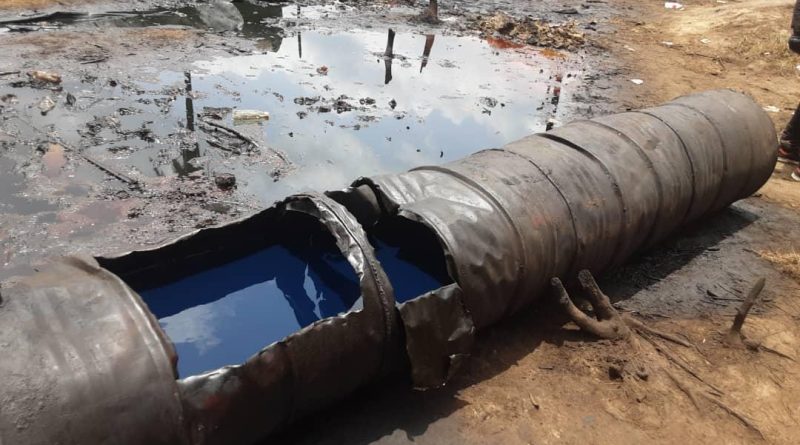Pollution: One Billion Litres Of Oil Released Into The Niger Delta Ecosystem- Coalition Laments… Invites Tinubu To Visit Region To See Level Of Devastation
By Bukar BOLORI
President Bola Tinubu has been asked to personally visit the Niger-Delta region in order to have a firsthand information on the devastating effect of oil spillages in the region.
Addressing a press conference on the cleaning up of the Niger Delta and resolving the prevailing environmental genocide on Friday in Abuja, a coalition of civil society organisations and stakeholders, Coalition for a Cleaned Niger Delta (CCND), claimed that a billion litres of crude oil equivalent have been released into the Niger Delta ecosystem as the price paid by communities in the area for Nigeria’s oil production.
The team which was led to the press conference by Executive Director, Health of Mother Earth Foundation (HOMEF), Nnimmo Bassey, and Founding Executive Director, African Centre for Leadership, Strategy & Development (Centre LSD),Otive Igbuzor, said: “We trust our president is well aware that the ecosystem of the Niger Delta has for about seventy years been plagued by unprecedented perennial pollution from petroleum production activities, enabled or worsened by a highly dysfunctional, conflicted and compromised environmental regulatory system, since the country struck commercial oil in the Oloibiri Province prior to Nigeria’s Independence. This festering devastation has projected and ranked Nigeria’s Niger Delta among the worst oil and gas polluted regions in the world.
“By the very limited official records of Nigeria’s spill detection body (National Oil Spill Detection and Response Agency – NOSDRA), there were 16,263 (sixteen thousand, two hundred and sixty-three) oil spills within the 17-year period of 2006 to 2023.
“This accounted for about 823,483 (eight hundred and twenty-three thousand, four hundred and eighty-three) barrels of oil spilt, equivalent to 4,103 (four thousand, one hundred and three) tanker trucks or 130,933,797 (one hundred and thirty million, nine hundred and thirty- three thousand, seven hundred and ninety-seven) litres of crude oil, from NOSDRA data. These figures are a fractional slice of the reality, as they exclude 5,456 (five thousand, four hundred and fifty-six) spills for which the spiller companies did not provide NOSDRA with estimates of spilled quantities. Besides, estimates are usually and “understandably” grossly suppressed by operators. Data for some mega spills, like the Aiteo blowout at OML 29 that lasted for 38 (thirty- eight) days in November-December 2021, are also omitted.
“Furthermore, it would be noticed that NOSDRA’s conservative spill statistics cited above do not include data for all of 50 (fifty) years from 1956 when Oloibiri Well 1 was spudded, till 2006 when NOSDRA was created. We also omitted gas volumes flared continually for 68 (sixty-eight) years, and the equally deleterious millions of barrels of toxic effluents/“produce .water” discharged untreated into the rivers, swamps and mangroves as waste in the course of production. If allowance is made for these omissions and non-disclosures, easily one billion litres of crude oil equivalent have been released into the Niger Delta ecosystem as the price paid by communities there for Nigeria’s oil production.”
The Coalition while narrating the plethora of infractions done to the environment in the Niger Delta for over six decades, said: “Considering the apparent failure of a long line of Presidents, Petroleum and Environment Ministers, and Chief Regulators, to recognize the indescribable gravity of this ravage, its severe socioeconomic and security repercussions for Nigeria, and to comprehensively resolve it, we invite Mr President to pay a spot visit, along with the relevant Ministers and Regulators, and possibly the National Security Adviser, to some of the following locations, which are too few as examples of devastation, to see for yourself: Polobubo and Ogulagha in Delta State; Ibeno, Mbo and Ikot Ada Udo in Akwa Ibom State; Awoye in Ondo State; Bille, Obagi and Rumuekpe in Rivers State; and Gbarain/Ekpetiama, Nembe,Aghoro and Otuabagi (where Nigeria’s pioneer oil wells are located) in Bayelsa State.”
They warned that: “Amidst the global dynamics of the 21st Century, and particularly in the context ofclimate change/action, Nigeria cannot continue to act as if ignorant of the importance of its biodiversity endowments and ecological imperatives. There are many countries we can benchmark, which produce more oil, gain far higher revenues from it, but still jealously and profitably protect their environment and ecosystems. Norway which has a trillion-dollar Sovereign Wealth Fund from petrodollars (and population of 5.5 million, againstNigeria’s 228 million) is a prime example, but ensures its waters stay pristine, enabling its robust fishing and marine industries. Scotland and the UAE among others.”
The Coalition stated that: “We trust that Mr President and the government are mindful of Nigeria’s numerous commitments to international treaties and conventions, including those on universal rights, environmental and indigenous people’s rights, and climate change. Mr President’s commitments to a world audience at the UN Climate Conference (COP 28) in Dubai, UAE, barely four months ago are also fresh in mind. A genuine action to cleanup the Niger Delta will be an excellent progress report for Nigeria, and particularly for Your Excellency, as the world gathers again at the next Climate Conference, COP 29, in about six months from now.”
They further said: “The protracted social injustice of funding national development at such extreme ecocidal expense of communities in the oil-producing Niger Delta region, or communities wherever else in Nigeria, needs to be urgently redressed, without any pretences as witnessed under previous Administrations. With the ongoing divestment of their remaining onshore holdings in Nigeria by the major international oil companies (IOCs), and their huge outstanding environmental liabilities thrown into legal uncertainty, thereby portending further risks and escalation of social tensions for communities, the time for Mr President to act as the Protector-in-Chief of Nigerian communities is now.”
The Coalition said: “We recommend that to resolve the environmental crisis and create an unprecedented legacy in the Niger Delta and Nigeria in general, amongst other cardinal priorities, the following actions should be taken:The President should Issue an Executive Order creating a Niger Delta Environmental Remediation Programme and Trust Fund. This can be either independent of or domiciled in the extant Hydrocarbon Pollution Remediation Project (HYPREP) currently overseeing the cleanup of Ogoni Land, but with a separate Trust Fund from the Ogoni Trust Fund, an expanded Governing Council and an unimpeachable Management system designed to avoid the contradictions that have historically bedeviled HYPREP and the debatable progress of the Ogoni Cleanup. The tasks of the Programme would include a definitive health audit besides the standard environmental audit of impacted areas.
“Adoption of the National Principles on Divestment and Decommissioning in the Nigerian Oil Industry in line with the one recently compiled by a wide coalition of community, civil society and international organizations, following extensive field missions and engagements in the Niger Delta.
“Panacea for Oil Theft and Asset Vandalization: To avoid or minimize re-pollution, optimize production and abate associated insecurity, enact a carefullyarticulated approach to this economic crime (based on broad and in-depth stakeholder consultations, which we are prepared to be part of if required). The new strategy should be preventive,proactive, inclusive, accountable, and lookbeyond current official reliance on state and non-state military methods that can often be tragically counterproductive, as results have shown intermittently.”
In order to fund the interventions, the Coalition suggested a combined action with the Federal Government’s financial latitudes, the primary funding should be from the operators and JV partners in oil/petroleum leases, based on credible costings for remediation within their respective acreages and in line withthe universal Polluter Pays Principle (PPP).
“Additional funding sources could include: the Environmental Remediation Fund created but yet to be operationalized under the Petroleum Industry Act, gas flare penalties paid by operators, part of theexisting Ecological Fund, at least to cover immediate region wide impact and cost assessments; a portion of the statutory funds of the Niger Delta Development Commission, whose statutory mission expressly includes an ecological/pollution resolution mandate that is largely neglected sinceits inception; Decommissioning liabilities and restoring funds in oil mining agreements and international environmental, climate and impact funds/resources that can be leveraged through appropriate strategies and channels.”



